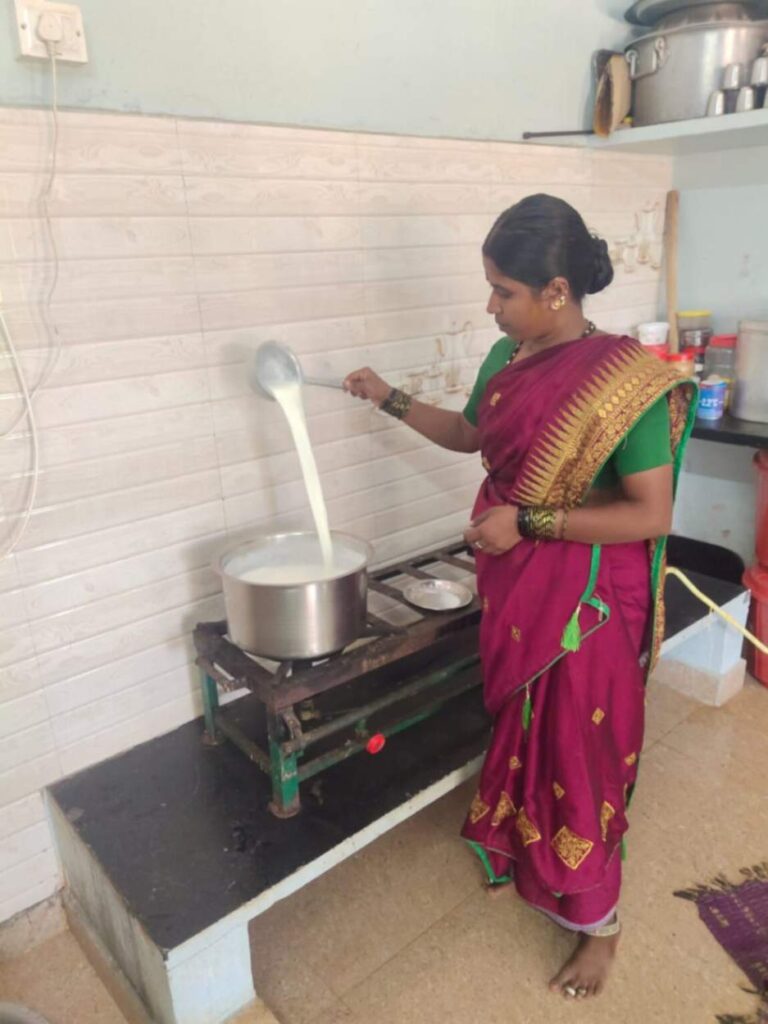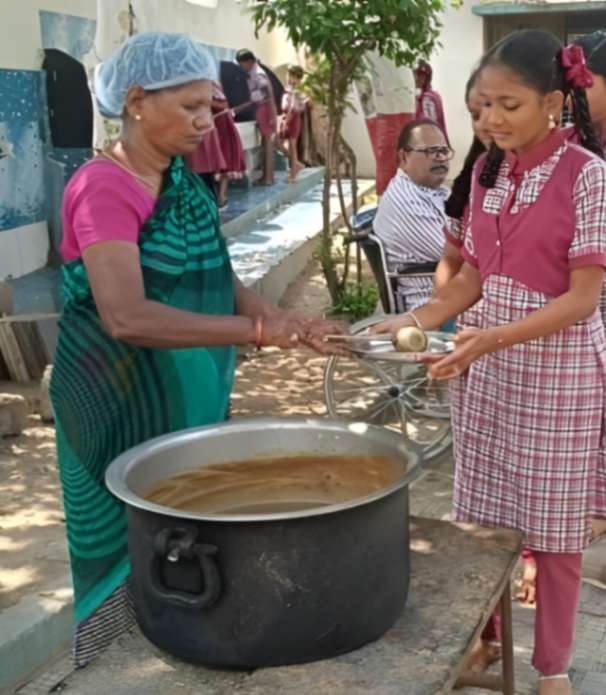Sustainable Procurement
Ragi procured for the production of Millet-based Mix, is directly sourced from the farmers. The factory has signed an MOU with the Subiksha Cooperative Society of Tiptur Taluk of Tumkur District. For the year 2023-24, we have sourced over 6,000 tons of ragi which shall be used in phases according to the requirements of production, and in return, we compensate farmers with prices higher than the current market rate. The government establishes a price called the Minimum Support Price (MSP) for farmers, at which the produce is procured.
Here, at the Annapoorna Trust, our esteemed founder, Sadguru Sri Madusudan Sai, coined a term called Minimum Livelihood Price (MLP), where the price at which the produce is procured is significantly higher than the MSP. This effort has helped us procure organic raw materials for our product at the same time extending our support to our farmers to achieve success in their agriculture practice.
ESG Model
SaiSure Nutrients embraces an ESG framework, dedicated to a sustainable, impactful, and resilient business approach. This model embodies the true essence of entrepreneurship—serving a greater cause by contributing to the well-being of society.
Environment
Why it Matters?
As a manufacturing unit, evaluating the product’s outcomes and potential impact on the environment is essential. A responsible manufacturer must take every possible measure to prevent environmental damage and decay, ensuring the production process is sustainable and eco-friendly.
What We Do?
- In accordance with ESG standards, buildings must ensure that emissions are released above a certain height to mitigate air pollution. The SaiSure factory is equipped with a chimney that are aligned with these requirements and effectively managing emissions from its diesel generators and contributing to improved air quality.
- The five-story factory, with each floor dedicated to a specific machine process, is equipped with filter bags. These filter bags effectively capture dust and minute particles, ensuring that only clean, filtered air is released into the environment.
- SaiSure manufactures products that do not require water, thereby minimizing water pollution. Additionally, domestic waste is treated using an STP (Sewage Treatment Plant), and the treated water is repurposed for garden irrigation, promoting recycling and water reuse. The factory has also installed low-flow toilets, showerheads, and faucets to reduce water usage.
- The factory has upgraded the lighting in the factory to energy-efficient options, such as LED lights. LED lighting uses less than 80% of energy compared to the standard incandescent bulb. This alone will help reduce your carbon footprint due to the small amount of fossil fuels being burned to produce it.
- The packaging uses biodegradable or recyclable packaging material to reduce waste and minimize harm to the environment
- The factory has a laboratory which thoroughly examines the product through various chemical and physical tests to ensure the product is free from harmful chemicals and issues a COA giving a go signal for human consumptio.
- The ingredients and raw materials are completely eco-friendly and organic which have minimal effect on natural resource.
- For all the basic cleaning insidie the factory, Zero TDS RO water is utilized, ensuring a microbe-free environment for our processes. This helps in producing safe and clean products.
- The silica-based dehumidifier system maintains a temperature of 20-22 degrees Celsius and a relative humidity of 40-45% in the process areas. This creates a zero-moisture environment, effectively preventing mold and fungal growth, especially given that many of the key ingredients, like Skimmed Milk Powder and Chocomalt, etc. are hygroscopic, meaning they absorb moisture from the atmosphere.
- The cleaning process involves using both hot and cold RO water in the process areas, which further prevents microbial growth.
- The hot water used is entirely generated by a solar plant installed on the terrace.
Social
Why it Matters?
Businesses can incorporate sustainable practices, ethical labour, and community engagement into their operations. This often includes supporting local communities, reducing environmental impact, and promoting fair trade.
What We Do?
- Develop and enforce policies that promote fair and safe working conditions, such as non-discrimination and anti-harassment policies, and provide training to all employees on these policies
- The factory also includes ESG criteria as a part of their contracts and agreements with suppliers to ensure adherence to sustainable practices in supply chain management
- offering opportunities to the youth, and the potential future of our country. Our team is composed of dedicated young adults, each showcasing expertise in their respective fields
- 1/3rd of the workforce are women. The factory employees women from the surrounding villages and rural setups as a way of generating standard employment along with a stable income
- The factory also ensures that the organisation operations and supply chain do not violate human rights laws such as forced labour or child labour
- Active participation in community involvement and through volunteering and philanthropy to create awareness of purposeful living.
- The factory has extended its support in outreach efforts by providing packets of SaiSure to states such as Indore, Jharkhand, Uttarakhand, and various Northeastern states. These packs are distributed through the Sri Sathya Sai Annapoorna Trust, which manages the distribution of this charitable product.



Governance
Why it Matters?
Maintaining transparency, accountability, and ethical business practices, and ensure that the company is well-governed and operates with integrity.
What We Do?
- The factory maintains transparency providing clear and honest information about the various operations and financial performances to stakeholders. This includes regular reporting on the company’s financial and operational performances, as well as making available information about key business practices, policies and process
- Being a ‘social enterprise’ the factory emphasises extending its support to manufacture first for NGOs and other organisations such as Akshaya Patra and Ramakrishna Mission, which mainly aspire to serve the needy
- Through its commercial brand Nutri5+, the factory has set up a self-sufficient system. The products are sold online and through local tie-ups within Chikkaballapur at a price which is 20% lower than the current market price. The profits raised by the brand, in turn, go to feeding the children and needy through its distribution platforms and partners – Sri Sathya Sai Annapoorna Trust, Prashanthi Balamandira Trust, and Sri Sathya Sai Health and Education.
Human Capital
- Currently, the factory works with over 30 employees including one Microbiologist and one QC Chemist.
- The factory operates in two shifts and each shift requires 14 employees on the field
- Women empowerment – 25% of the working staffs are women. These ladies are from the nearby villages around the factory area. The work helps in managing and sustaining their families who were doing odd jobs earlier.
- Staffs are given free food from the ashram and assured the best healthcare facilities from our own free Multi Speciality Hospital.
- All the ESI & PF benefits are ensured to all the staffs enrolled with SaiSure fir
- A zero attrition rate is maintained even after nearly two years of operations. As the staff are valued, and this mutual respect is reflected in the workplace culture. Ongoing training and discussions on topics such as basic hygiene, Good Manufacturing Practices (GMP), effective communication, English language skills, and spirituality are provided.
- All the Staffs are well versed inthe 5C’s of the ashram culture – Concern for Others, Cleanliness, Communication, Collaboration & Continuous Improvement and as well as the 5D’s to be followed as per Individual excellence such as Duty, Devotion, Discipline, Discrimination & Detachment.



